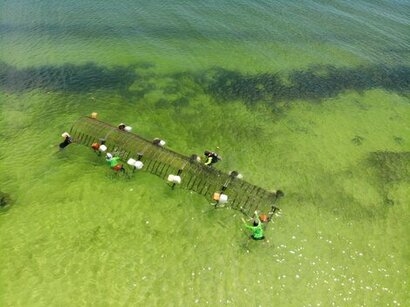
CCell, led by Dr William Bateman (ex-Imperial College, London), has deployed its first full-scale artificial reef off the Mexican village of Telchac, to slow down the effects of coastal erosion, caused by strong and more frequent storms and rising sea levels – both unfortunate consequences of climate change.
Using energy from an onshore solar farm and using hi-tech electronics, CCell has developed a special technique - using pulses of energy to drive an electrolytic process to extract seawater minerals - to create an artificial reef by growing limestone rock to which corals can be attached. The reef, at 120 metres long (and 2.3 metres wide), is the longest and largest electrified artificial reef to be deployed in the Caribbean.
The reef, a high-tech steel structure, causes waves to break before they hit the shore, and provides marine life with a new habitat that allows the marine ecosystem to flourish. By having a healthy reef, with an abundance of marine life, the CCell reef will provide a stimulus for eco-tourism.
CCell’s technology, which has benefited from UK Government support via Innovate UK and private investment from the Crowdcube crowdfunding platform, plans to extend the length of the Telchac reef this year, and has similar projects earmarked for other locations in Mexico and the Caribbean.
“With coastal communities around the world at risk from the perils of climate change, our reef technology - a ‘plug-in digital reef’ - can slow down coastal erosion which we have seen is putting people’s home and livelihoods at risk around the world” said Dr Will Bateman, Founder and CEO of CCell. “We can protect communities from the impacts of climate change and at the same time improve marine ecosystems. Also, a healthy and vibrant coral reef, with an abundance of marine life, will provide a fantastic boost to eco-tourism – diving holidays and educational trips. In many coastal areas, responsible eco-tourism will bring huge, long-term economic benefit. Political support for our work is hugely important if we are to deploy more reefs in the Caribbean and around the world. We are grateful that the Mexican Government and the local state authority immediately saw the advantages of the CCell approach at Telchac; they both recognised the environmental and economic benefits thar our solution could offer local people.”
CCell’s modular steel frame structure is manufactured in Mexico and will be controlled remotely from its London base. It has been designed to have a lifespan of 20 years, but with the growth of rock and a thriving coral ecosystem it should live well beyond that.
The company’s R&D work has benefited from partnerships with a range of organisations and companies, including the Living Reef Foundation, University College London, Solidworks and Vicor.
For additional information:

